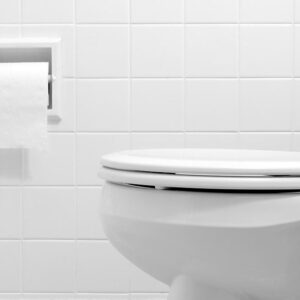
STOP 3 Steps to PERFECT Digestion
Remember the good old days when you had an “iron stomach?”
You could throw down a few slices of pizza and a beer with no problem.
Now, though, it seems like everything upsets your stomach and leaves you with bloating, constipation, and gas.
But what if you could erase your stomach problems for good?
All you need is the same three-step plan I’ve recommended to my own patients.
I promise you’ll start feeling relief FAST!
The three keys to gut health are: fiber, probiotics, and prebiotics.
If you are getting these three things right, then 99% of gut problems disappear.
So, let’s first start with definitions.
Fiber: Fiber is a carbohydrate you cannot digest. There are both soluble fibers (which swell in water) and insoluble fibers (which don’t swell in water), and getting a mixture of these fibers is important to reap the health benefits of dietary fiber. Fiber helps lower cholesterol, keep your blood sugar stable, and make it easier to lose weight.
Probiotics: These are beneficial microorganisms that are found in your digestive tract. These good microbes fight infections, help digest the food we eat, interact with our immune system, and provide us with vitamins and minerals.
Prebiotics: These are food for the probiotics. Without prebiotics, the probiotics have no chance of growing and multiplying.
So, here is how you optimize your digestive tract:
- High-Fiber Foods: You should get around 25-40 grams of fiber each day. Guess how much most Americans get? About 12 grams. Some people get almost none. If you don’t eat a lot of fiber, be careful about adding a lot at a time because it will increase gassiness. Try adding more berries and vegetables (which have soluble fiber) to your diet.
- Probiotics: If I were to write out all the health benefits to probiotics, it would take pages to finish. Not only are these little critters great for your digestive tract (they help both constipation and diarrhea), but they are also great for your immune system, weight loss, and many other body systems. You can increase good bacteria by eating fermented foods (yogurt, kefir, real sauerkraut, miso…) and you can take probiotics as a supplement.
- Prebiotics: You can purchase these “digestion helpers” online or at just about any vitamin or supplement shop.
There you go: the road to a healthy digestive tract. But, you know me by now, I’m going to tell you a few more things to stay away from that can also help your digestion:
- Alcohol and caffeine: If you are someone with a sensitive digestive system that tends toward diarrhea, you need to reduce alcohol and caffeine consumption.
- Sugary drinks: Sugar causes bad bacteria and yeast in your gut to multiply. Do what you can to avoid all sugars, but especially soda and fruit drinks.
- Sugar-free anything: I could write a book about the bad effects of sugar substitutes, but when we are talking about gut health, you need to know artificial sweeteners destroy the healthy bacteria in your gut.
Written By Dr. Scott Olson, ND
Nearly 25 years ago, failed mainstream medical treatments left Dr. Olson in constant pain – and his health in ruins. And that’s when he did something REVOLUTIONARY. He began his career in medicine – and dedicated his life to uncovering the true, underlying causes of disease.
Through his innovative medical practices in Tennessee and Colorado, Dr. Olson has helped cure countless seniors from across America of arthritis… heart disease… diabetes… and even cancer. All without risky prescription drugs or painful surgeries.
View More Free Articles
WARNING—Your Water Bottle Is Hiding a Disgusting Secret
Recently, a few people have asked me if it’s true that their water bottle has more germs than a toilet seat. It’s a shocking comparison that’ll make you think twice about everyday objects you use without much thought. So, is this claim true? Well, I must warn you that you might not like the answer…...
Research Reveals 3-for-1 Brain Protection "Checklist"
Age-related brain diseases—including stroke, dementia, and depression—threaten our quality of life. They can take the shine right out of your Golden Years. But you don’t have to take these threats lying down. While there are no guarantees in life, there are steps you can take to turn the odds in your favor—especially when it comes...
Mailbag: Your “Healthy Diet” Might Leave You Running on Empty
“Do supplements really work?” Hopeful Skeptic Hi Hopeful, That’s a fantastic question! It gets straight to the heart of a vital fact about human biology. Our bodies are incredible machines. But they don’t work in a vacuum. They require outside help to function. For example, they can’t manufacture most vitamins and minerals on their own....
Forgotten 80s Superfood Reemerges as Artery Superstar
Do you remember when vitamin E was the talk of the town? This common nutrient had a surge of popularity in the 80s and 90s. But now I can’t remember the last time I had a patient ask me about it. Well, it turns out this forgotten 80s superfood deserves another moment in the spotlight....
Strokes CAN Strike Twice—This Simple Fix Cuts Your Risk 20%
They say lightning never strikes twice in the same place. But that old adage couldn’t be further from the truth when it comes to strokes. If you’ve had a stroke, you might think you’re out of the woods once you recover. But the reality is far different… A comprehensive study published in JAMA revealed the...
Can Your Diet Defend Your Brain From Aging?
Our brains work hard every day, helping us solve problems, create memories, and connect with loved ones. But as we age, they face new challenges that can quietly chip away at our vitality. One of those challenges? The buildup of iron. Though iron is essential for many functions, too much can harm your brain, contributing...
Common Deficiency DOUBLES Risk of Your Body Attacking Itself
Most of us know vitamin D as the “sunshine vitamin.” And many think of it mainly for bone health as we age. But research now suggests that this nutrient may be just as crucial for supporting our immune system throughout life, beginning as early as childhood. In fact, a lack of vitamin D, especially in...
What Is a Healthy Night’s Sleep? Three Critical Criteria
We’ve all heard the advice about how important getting enough sleep is to your health. Heck, I have even given this advice countless times. But here’s what the so-called sleep experts aren’t telling you—that perfectly uninterrupted eight hours of sleep they keep preaching about? It’s a myth. In fact, if you wake up several times...
Can Your “Poop Schedule” Predict Disease?
We all do it. If you’re alive, you poop. Some of us are so regular that we could set a clock based on our bathroom habits. Others, not so much. And yet, talking about bowel movements remains one of those taboo topics. Even your doctor skims over it during your annual checkup! But the truth...
Mailbag: "Digestive Drama" Strikes MILLIONS Over 50
“As an older woman I’m noticing changes in my digestion. Why does it become more difficult to digest food as we get older?” —Grumbling Gut Age-related changes to digestion are common, and they don’t get talked about nearly enough. It seems our stomachs decide to alter the rules just when we’ve mastered the game of...









